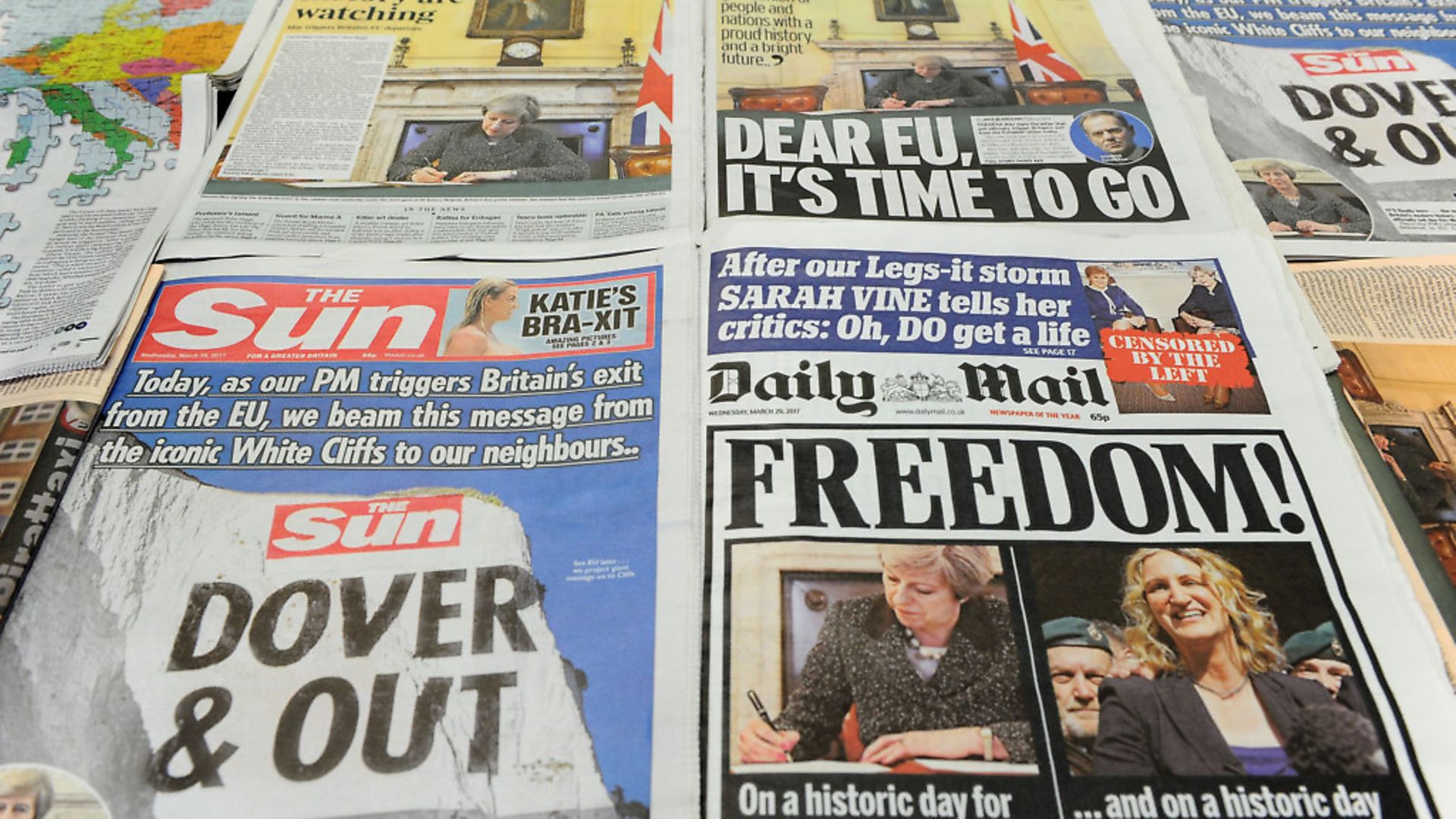
A former Fleet Street editor explains how the national press has abandoned its duty to inform in favour of printing propaganda
The 2016 referendum asked voters for a simple ‘yes’ or ‘no’ to settle whether Britain should remain a member of the European Union.
Whichever side of the debate you were on, it was commonly accepted that this was the most significant decision the UK had taken in generations.
Though the question on the ballot paper appeared to be a simple one, the decision was, in fact, mind-numbingly complex – with untold consequences for trade, agriculture, security, jobs, the economy, education, migration, human rights, the courts, regulation, food standards and much more.
Faced with such a stark choice, what might a country want from its journalists? The answer is, surely, obvious. We, the voters, would want to understand the facts on both sides of the argument, presented as neutrally as possible, so that we could make up our minds on the basis of the fullest possible understanding of the risks and opportunities. That was role of the journalist as envisaged by American philosopher John Dewey, who, in the 1920s, expounded the case that the press should create an educated public, which, in turn, would lead to a better democracy.
We might add this: We, the voters, get that this is a complex issue, so we would greatly value the skill of reporters in presenting complicated material in an accessible way. Conversely, please don’t insult us by assuming we can’t deal with complexity. Even more strongly, we ask that you don’t pretend that this is, in fact, a simple choice when it obviously isn’t. Having done that essential and basic job of proper journalism, if you would like to tell us your view as a newspaper, then fine. Better still, we would appreciate a spread of views.
That is not, in fact, how much ‘proper’ journalism behaved. Indeed, quite a few influential newspapers started from the opposite position: This is a simple question on which we, as a newspaper, have a very strong opinion. Our opinion will be very evident in most of what we do and we will not trouble you with alternative views. We will do some reporting of the campaign, but most of it will be around the personalities rather than the issues.
Over the four-month campaign, the Leavers hugely outgunned the Remainers in the press. A Reuters Institute study found that, factoring-in reach, 48% of all referendum-focused articles were pro-Leave, with just 22% pro-Remain. Three quarters of all articles in the Express were pro-Leave, followed in partisanship by the Mail, Sun and Telegraph.
The billionaire then-owner of the Express, Richard Desmond, was a prominent supporter of the main pro-Brexit party, UKIP, giving it £1million in 2015 on top of the £300,000 he had given the previous year. Over at the Sun, the management spent nearly £100,000 publishing a pull-out poster backing Brexit, forcing its parent company, Murdoch’s News Group Newspapers, to register as an official Leave campaign group with the Electoral Commission, which was regulating spending on the campaigns.
The cost of the poster made NGN one of the largest spenders among 48 groups whose finances were revealed. Apart from that, the Sun spent more time campaigning for future British passports to be ‘patriotic’ blue than in explaining how their readers’ jobs or services might be negatively impacted by a vote to leave.
But the four-week campaign was, for some editors, just the icing on a cake they had been baking for a decade or more of anti-European coverage. Few readers of the euro-hostile press would, over time, have been exposed to arguments that membership of the EU brought any benefits at all. In addition, the two main mid-market tabloids repeatedly splashed on negative stories about migrants – 72 splashes in the Express and 56 in the Mail in the run-up to the referendum. One academic study found they used the same language to describe the movement of water, insects, or epidemics. Migrants were ‘swarming, swamping, storming, invading, stampeding, flocking, over-running, and besieging the UK’.
Editors were quite frank about what they were up to. The then-Express editor, Hugh Whittow, proudly admitted that the referendum was the culmination of a five-year ‘crusade’, including a ‘unique 24-page supplement’ carefully setting out the case for a UK withdrawal published five years before it actually happened. To him, this was what journalism was: ‘Those who voted on June 23 to be free and independent were surely delivering a similar vote of confidence in the newspaper industry.’
So the issue of European membership was, for many years, filtered through an unrelentingly hostile lens – a bit ironic given that the same papers regularly protested that the internet creates ‘filter bubbles’ in which users are only exposed to views with which they agree.
If the coverage had nonetheless been accurate that would be some mitigation. But the same Brexit-boosting newspapers were – according to the European Commission itself – the leaders in perpetrating myths about how the EU would destroy British sovereignty: bananas will have to be straight; cows will have to wear nappies; milk jugs will be banned; Bombay mix will be renamed; women will have to hand back old sex toys, and so on.
One of the reporters who delighted in this style of reporting was Boris Johnson, the Telegraph’s man in Brussels in the early 1990s. One of his former colleagues, Jean Quatremer, wrote of his technique: ‘Johnson managed to invent an entire newspaper genre: the Euromyth, a story that had a tiny element of truth at the outset but which was magnified so far beyond reality that by the time it reached the reader it was false.’ Johnson became one of the leading architects of Brexit and, later, foreign secretary.
The campaigning organisation InFacts secured 10 corrections to inaccurate pre-referendum stories after complaining to the press regulator IPSO – including the Sun’s explosive, but unsupported, claim that the Queen backed Brexit. But, according to InFacts director, Hugo Dixon, it took an average of 89 days for the newspapers to set the record straight.
Just days before the vote, the Mail splashed on a story reporting ‘yet another load of migrants arrives in UK declaring WE’RE FROM EUROPE – LET US IN!’ This, as the paper acknowledged the following day, was untrue: the migrants were from Iraq and Kuwait, not Europe. A small correction appeared on page two.
The hectoring and misrepresentation did not end with the vote. The Mail – and to some extent the Telegraph – used their front pages to accuse and, effectively, bully those who disagreed with their views on Europe.
Three examples stand out:
1) Judges. Three High Court judges ruled that the government would need parliamentary consent before it could start triggering procedures to leave the EU. The Mail responded by running mugshots of the judges over the headline ‘Enemies of the People’, a phrase with an ugly ancestry that could be traced back to the early days of the Soviet Union. A strapline said there was fury over ‘out of touch’ judges who had ‘defied’ 17.4 million Brexit voters and who might thereby trigger a constitutional crisis. But this was all legally illiterate nonsense. The judges – as the Supreme Court was to confirm – were simply interpreting the law. In western democracies, we treasure the independence of the judiciary. Only in the editor of the Daily Mail’s mind were they ‘enemies of the people’.
2) MPs. Theresa May’s decision in April 2017 to call a general election was reported by the Mail with the blaring headline ‘Crush the Saboteurs’ – supposedly what the prime minister had ‘vowed’ to do to those whom the Mail’s strapline referred to as ‘Remoaners’ (people who continued to disagree with the Mail over Brexit). In seeking the return of British parliamentary sovereignty, the Mail regarded dissenting MPs’ voices not as legitimate debate but as sabotage. (In the event, far from crushing those who disagreed with her, May lost her overall majority in the election.)
3) MPs. The democratic endorsement of a general election vote was still not sufficient for the Telegraph and Mail, who continued to gun for MPs with principled disagreements over Brexit. The Telegraph, once the most understated of broadsheets, produced a front page dominated by 15 photographs of MPs intending to vote against another stage of the parliamentary Brexit proceedings under the headline ‘The Brexit Mutineers’. When, a few weeks later, the government was defeated the Mail echoed the Telegraph treatment with photos of the rebel MPs under the sneering headline ‘Proud of Yourselves?’
An MP – Jo Cox – had been murdered in the run-up to the referendum campaign by a far-right extremist who shouted ‘Keep Britain independent’ and ‘Britain first’ as he shot and stabbed her. On those grounds alone, a newspaper editor might think twice before running headlines that were certainly experienced as intimidating, some of which were followed by death threats.
But the bigger point, for present purposes, is an editorial one. The 1920s classic Dewey justification for journalism – that it creates better informed citizens who can thereby make more considered choices about their society – simply didn’t work with Brexit.
A group of influential editors decided their job was to advocate, not inform. They deliberately created filter bubbles of partial information that would, they hoped, deliver the result they (or their proprietors) wanted. If that included also handing over money to political parties or printing propaganda, so much the better. Was that ‘proper’ journalism?









